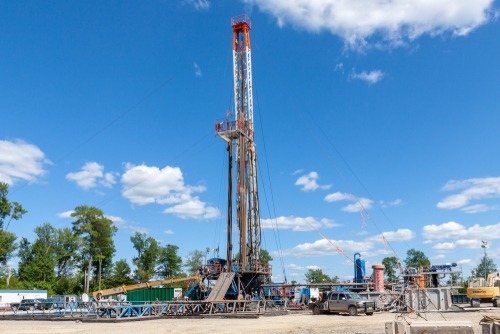
Pennsylvania needs to take full advantage of the natural gas resources inherent in the Marcellus Shale footprint that covers more than half the state, business and industry advocates said at an energy briefing in Berks County on Wednesday, and policies that stifle energy production will have serious consequences for the state and the nation.
“We want to maximize production of Pennsylvania energy,” said David Taylor, president and CEO of the Pennsylvania Manufacturers’ Association. “We need to have affordable, available, abundant market-priced energy to have the inputs for the chemistry that makes possible all of these different manufacturing processes. If we do it right, it can be Pennsylvania jobs all the way down.”
Taylor spoke during a Think About Energy Briefing today focused on Berks County and its place on the world energy stage. Representatives from the Greater Reading Chamber Alliance and UGI Energy Services also spoke during the panel discussion hosted by George Stark, director of External Affairs with Coterra Energy, which is active in the Marcellus play principally in Susquehanna County.
Coterra Energy’s production of ammonia, made possible because of the availability of dry natural gas in Susquehanna County, as well as the start-up of the Shell ethylene cracker plant in Beaver County, are examples of Pennsylvania’s strength in petrochemical manufacturing. Those types of investments will be bolstered by supportive policies such as Act 66, which was signed into law in 2021 and aims to attract petrochemical plants to Pennsylvania with manufacturing tax credits.
“There’s no good reason,” Taylor said, “that Pennsylvania shouldn’t be home to the kind of ammonia production that would help secure American farmers’ access to domestically produced chemical fertilizers.”
Taylor emphasized the value of natural gas as a material resource – not just for energy. He noted the Russian strategy to generate electricity with nuclear plants so that natural gas resources could be exported to provide for the myriad of uses and products dependent on gas, from plastics to medicine to fertilizer to feedstock chemicals. “These inputs are necessary for making every consumer good and every product you and I purchase and handle every day,” Taylor said.
If state and federal legislators commit to a pro-growth agenda, Pennsylvania could become the country’s No. 1 natural gas-producing state, Taylor said.
While Berks County does not produce gas, it’s a big energy user. The county has a strong agricultural base, but manufacturing is the biggest employer. “And so we’re on the receiving end of the cost of energy,” said Katie Hetherington Cunfer, director of Government and Community Relations at the Greater Reading Chamber Alliance. “We are the ones converting the raw materials into other products. When you have input costs that are rising through the roof, we’re stuck on the receiving end.”
She said the recent singular focus on non-carbon policies is out of synch with energy realities. For example, the effort to convert the public to electric vehicles is not necessarily bad, “but it’s not today,” she said, adding that “we don’t have the capacity. We don’t have the vehicles. We don’t have the batteries.”
Cunfer also referenced ammonia and fertilizer production. She noted that states like Iowa need synthetic fertilizers for their farm operations. “We have an abundance of riches nearby,” she said, “but we are facing a situation where we need this energy, we need this production, but there are policies being put in place by the Administration that are purposefully shutting it down.”
Uncertainties about energy policies and rising costs are impacting investment decisions in Berks County. Cunfer said that East Penn Manufacturing company in Lyons, a battery manufacturer, would like to hire an additional 500 employees. Wages have increased, and now automation is being considered. But that energy intensive move is hard to calculate in today’s market.
Pam Witmer, vice president of Government Affairs at UGI Energy Services, said the operations of UGI’s Temple LNG Plant in Berks County exemplifies some of the issues – and dilemmas – currently at play in energy discussions. The plant can move product via pipeline or trucks to customers locally and it serves customers in New England and the mid-Atlantic states. Witmer said UGI would like Temple’s production to increase but pipeline export capacity is full. Consequently, “we regularly truck gas in the winter to the mid-Atlantic and to New England. They have a lot of people living up there who like gas, but they don’t like pipelines.”
Witmer said that neighboring New York and New Jersey contest pipeline projects and work to prevent expansions and new investments. Cunfer noted that new infrastructure will go to Texas and Louisiana because those states are making pipeline investments while efforts in Pennsylvania are impeded or stopped by no-carbon demands.
None of the panelists opposed investments in renewable energy. Witmer, for example, noted UGI’s investments in solar facilities. But a larger perspective was clear: Pennsylvania and the United States need an “all of the above” energy strategy.